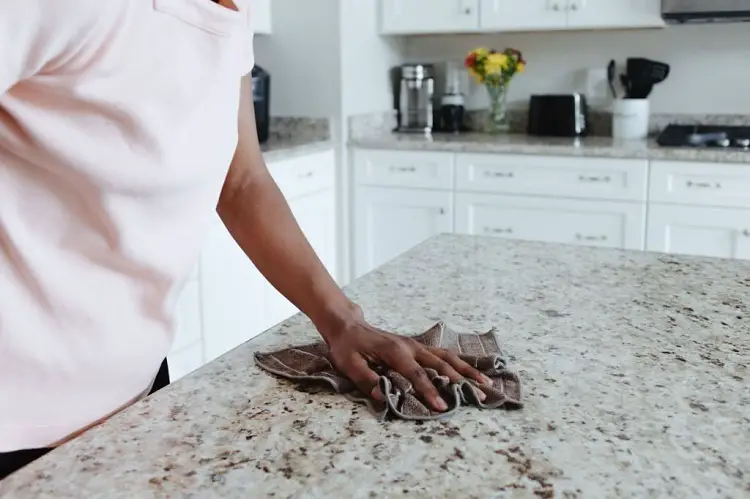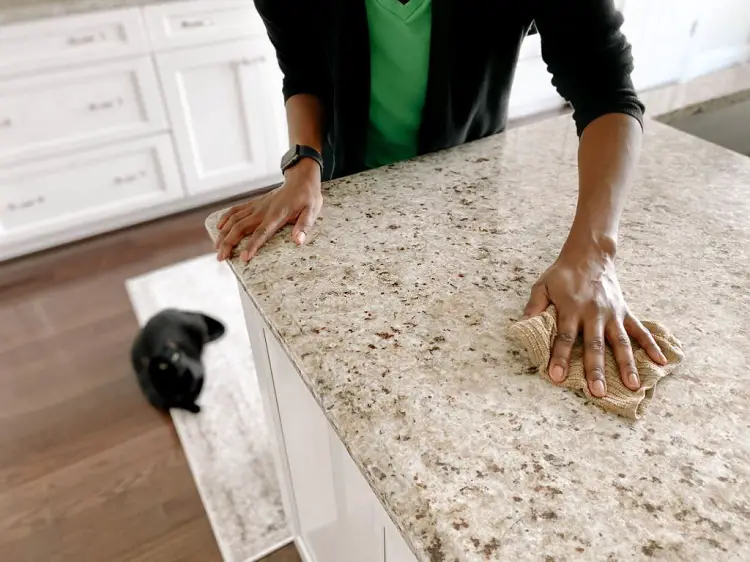Granite slabs are the ultimate choice for safe countertops for your kitchen, bathrooms, and other areas of your home or business.
You can never go wrong with this durable and reliable, stylish, and functional material.
A beautiful thing about granite tops is that they are not breeding grounds for bacterial growth, provided they are kept moist and food debris free.
Here is how to sanitize granite countertops
- Mix rubbing alcohol, dish soap, warm water, and essential oil in a spray bottle.
- Spray the cleaner on granite countertops and let it sit for 5 minutes.
- Wipe out any dirt, grime, and germs with a damp cloth.
- Clean the soapy residue with a clean damp cloth.
- Buff the surface with a dry microfiber cloth to make it shine.
The Best Method to Employ When Cleaning Granite Countertops
If you want to clean your granite countertops well and go about it the best way, use a mixture of warm water and liquid dish detergent.
It is an eco-friendly solution that removes grease, fingerprints, food, and buildup.
Soap and water wouldn’t be harsh on granite and can be used on your countertops as often as you like without risking damage.
If you want increased disinfecting power, you can add isopropyl alcohol to the mix.
Isopropyl or rubbing alcohol makes the cleaning solution excellent for treating microorganisms like bacteria and viruses like COVID-19.
Another beauty of using a mixture of Isopropyl or rubbing alcohol is that while it gives you disinfecting effects, it also preserves the finish and shine of your countertops.
Also, remember that the best way to clean granite, quartz, or other natural stone countertops is to follow the manufacturer’s recommendations.
How to Remove Stains From Granite Countertops
Using the sanitizing process, best makes your granite countertops look newer and better.
Using baking soda and hydrogen peroxide is ideal for cleaning most granite countertops’ stains.
You can clean the stain with baking soda and water paste if it is greasy. If it’s water-based, try using baking soda and hydrogen peroxide.
All you have to do is to apply the paste to the stain and let it sit for a few hours, after which the paste is wiped away, and a damp cloth is used to remove residue.
The solution for cleaning granite counters that look cloudy is to rinse the cleaning residue with water and dry the counter.
How To Sanitize Granite Countertops

When cleaning granite countertops, use a microfiber cloth to dust the surface first because they lift dirt instead of spreading it around.
Once you’ve done that, you’re ready to clean your granite counters, and it is best that you use homemade cleaners that are non-toxic for granite countertops.
Here are the cleaning items you’ll need for your DIY granite countertop cleaner and disinfectant:
- Empty spray bottle
- Dish soap
- Rubbing alcohol
- Essential oil
- Microfiber cloth
Step 1
Pour a half-cup of rubbing alcohol, a teaspoon of dish soap, and 1 ½ cups of warm water into a spray bottle.
Step 2
Add ten drops of your favorite essential oil to the spray bottle to create a pleasant aroma for your cleaner.
Step 3
After preparation, spray your homemade granite counter cleaner on the countertops, and try wiping away dirt, grime, and germs with a damp cloth.
Step 4
Use a clean damp cloth to clean the soapy residue, and buffs it with a dry microfiber cloth to make your granite shine.
Pro Tip:
If you want to be sure that you did a great job and that there is no dirt, you must do a palm test on the surface by running your palm through the surface.
If there is dirt, it will be shown on the palms of your fingers.
Things To Know About Sanitizing Granite Countertops
When considering installing granite countertops in your home, it is important to remember a few key details.
- Firstly, granite is a natural stone that is extremely durable and resistant to scratches and heat.
- Granite countertops are also available in various colors and patterns, making them versatile for any kitchen or bathroom.
- They require some maintenance, including regular sealing, to prevent staining and bacteria growth.
- You shouldn’t use harsh or abrasive cleaners and sponges on your granite countertops. A gentle cloth is key if you want your granite countertops to last long and remain unblemished.
- Additionally, granite can be quite heavy and may require additional support during installation.
Considering these factors, you can decide whether granite countertops are the right choice for your home.
Cleaners To Avoid While Sanitizing Your Granite Countertops
While cleaning and sanitizing your granite countertops, you must avoid using granite countertop cleaners with acidic properties.
It is important to avoid using bleach-based products and natural cleaning solutions like lemons and distilled white vinegar on granite surfaces as they can be too harsh and cause damage.
It is imperative to steer clear of cleaners containing acids and bleaching agents as they can severely damage the sealant and cause unsightly blemishes on the countertop.
How to Protect Granite Countertops
If you want to protect your granite countertops, then you have to save them from hard water and other hard-to-clean stains. You can go about it the following way:
Keep Granite Surfaces Dry
It is essential to keep granite surfaces dry to maintain their longevity and appearance. To achieve this, it is crucial to prevent hard water or liquid stains from sitting on them for long periods.
Similarly, it is essential to immediately wipe up any spills of oils or grease to avoid them saturating the surface.
After cleaning up, wash away any residue with soap and water to ensure the surface remains spotless and stains-free.
Following these simple steps, you can pristine your granite surfaces for years.
Protect Granite Countertops From Extreme Heat
Protecting your granite countertops from extreme heat is important to keep them looking their best.
Placing hot cookware directly on the surface can cause unsightly damage in the form of black marks and thermal cracks.
To prevent this, using potholders or trivets as insulation between the cookware and the granite is recommended.
By taking these precautions, you can maintain the pristine appearance of your beautiful countertops for years to come.
Guard against Impact Damage
Although granite is known for its exceptional strength and durability, it’s important to remember that heavy objects dropped on it can still cause chips and cracks.
It’s always a good idea to take care when handling heavy items around granite surfaces to avoid any potential damage.
Maintain the Granite Sealant
To ensure the effectiveness of your granite sealant, conduct a simple test by leaving a drop of water on the counter for 15 minutes.
When you notice that the water is only partially absorbed or when a dark spot remains after wiping it, it indicates that you need to reseal your granite.
Proper maintenance of your granite sealant is crucial for its long-lasting protection.
How Often Should I Reseal My Granite Countertops?
The answer is that resealing duration and process vary according to manufacturers and should be considered before it is done.
Granite must be sealed up to three times yearly to protect its finish and minimize oils and water from seeping into its hidden pores.
Keeping granite countertops clean and shiny takes energy, but the result is worth it.
Read Also:
- How To Get Rid of Plastic Smell on Stovetop
- Best Homemade Floor Cleaners for Hardwood Floors
- Can You Put a Microwave in a Cabinet?
- Kitchen Sink Smell Like Ammonia – 6 Reasons & Solutions
Frequently Asked Questions
What cleaners are hands-down safe for granite?
A mild dish soap or a commercial cleaner specifically designed for granite is recommended to safely clean granite.
It’s important to be cautious with all-purpose cleaners as they may contain ingredients, such as citric acid or ammonia, that can damage the surface.
You can also use natural cleaning products, but check the label beforehand. Avoid using abrasive cleaning pads and opt for a soft microfiber cloth instead.
Is natural granite porous?
It is important to note that natural granite is porous which can absorb liquids. Applying a sealer to the stone is necessary to prevent damage or stains.
The sealer acts as a protective layer and slows down the absorption process. Periodic checks should be conducted to ensure the sealer remains intact, and countertops should be resealed when necessary.
Can You Use Disinfecting Wipes On Granite?
Using disinfecting wipes on granite countertops is strongly discouraged.
The high acidity of their primary ingredient, citric acid, can weaken the seal on the countertop surface, making it vulnerable to stains and discoloration.
Despite their convenience and effectiveness, it is imperative to avoid disinfecting wipes on granite or any other natural stone surface.
Conclusion
I hope this article has given you in-depth knowledge on how to sanitize granite countertops. To sanitize granite countertops, mix one part water and one part rubbing alcohol in a spray bottle.
Then you spray it on the countertop and let the disinfectant sit for five minutes, after which you rinse with a damp cloth and buff the granite with a dry microfiber cloth to restore the shine.
Following these guidelines, you can keep your granite countertops looking beautiful and germ-free for years.

